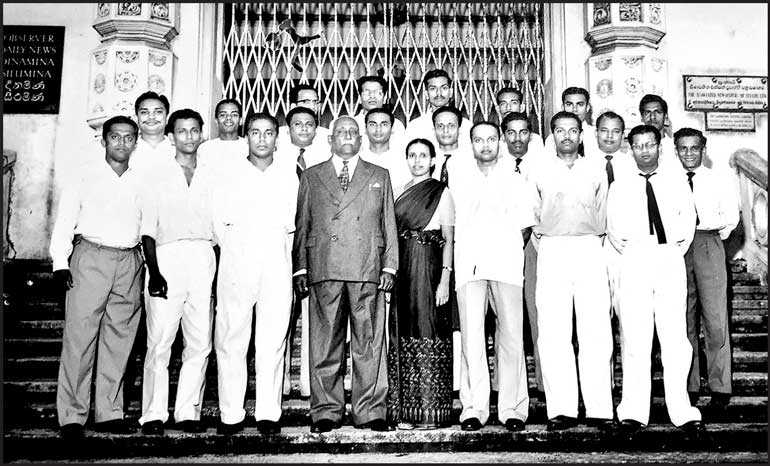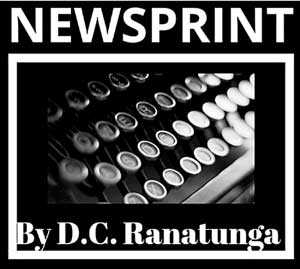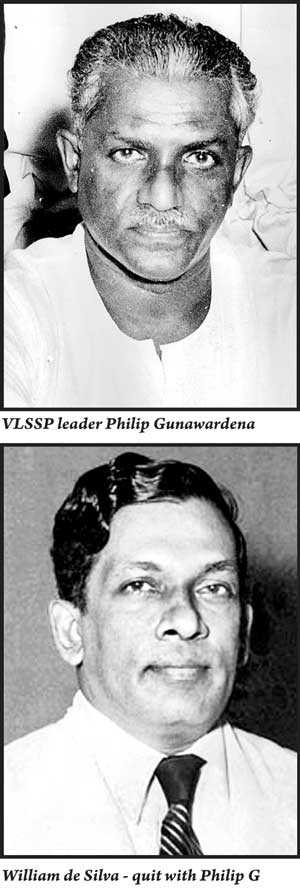Thursday Feb 12, 2026
Thursday Feb 12, 2026
Saturday, 9 March 2019 00:10 - - {{hitsCtrl.values.hits}}

Front row from left: L.E. Samararatne (Photographer), Pujita Wijetunga (News Editor), D.F. Kariyakarawana (Chief Sub-Editor), Loku Sir, Hema Wickremarachchi (Features Writer), M.A. de Silva (Managing Editor), Bandula Mettananda (Local News Editor) and Sisil Ilangakoon (Features Editor)
 In my news rounds I covered the Ministry of Industries and Fisheries. Minister P.H. William de Silva always welcomed me with a smile and discussed plans to open State corporations to handle vital industries. He was one of the two ministers from the Viplavakari Lanka Sama Samaja Pakshaya (VLSSP), the party led by Philip Gunawardena.
In my news rounds I covered the Ministry of Industries and Fisheries. Minister P.H. William de Silva always welcomed me with a smile and discussed plans to open State corporations to handle vital industries. He was one of the two ministers from the Viplavakari Lanka Sama Samaja Pakshaya (VLSSP), the party led by Philip Gunawardena.
He introduced me to the two Senior Assistant Secretaries, Charlie Abeysekera and Chandi Chanmugam, whom I met regularly. Even after they moved to other ministries I kept in touch and found them to be good news sources.
The early years of the 1956 Bandaranaike Government saw the implementation of several progressive measures. The Paddy Lands Act of 1958 initiated by Philip Gunawardena, Minister of Food and Agriculture, was a landmark piece of legislation which enhanced the status of the tenant cultivator ensuring security of tenure. In the months that followed came the multi-purpose co-operative societies, a guaranteed price scheme for paddy, and crop insurance – all linked to the Paddy Lands Act.
Economist G.V.S. de Silva, the University Lecturer in Economics who quit and became the Minister’s Private Secretary, assisted him in these initiatives. All these activities made good copy which could not be matched by work in most other ministries.
However, some members of the Cabinet did not like Philip G forging ahead with such forward-looking measures – either they were jealous of their success or were themselves unable to introduce such people-friendly legislation. This situation made the Prime Minister helpless. Being the Leader of the SLFP he had to depend on them where numbers were concerned.
As a way out of the problem, he changed Philip G’s ministerial portfolio and appointed him Minister of Fisheries. The change was resisted by Philip G. and he quit the Government on 18 May 1959 along with his party MPs, Minister William de Silva (Ambalangoda MP) and Parliamentary Secretary (deputy minister in today’s terms) Lakshman Rajapaksa (Tissamaharama MP).
Philip G adopted the name Mahajana Eksath Peramuna (MEP) for his party in place of VLSSP. He sat in the Opposition. In the 1960 general election the party won 10 seats and joined with the Lanka Sama Samaja Party and the Communist Party to form the United Left Front.
Old Anandians
Looking back there were several old Anandians attached to the ‘Silumina’, the highly popular – in fact the only – Sinhala weekly at the time.
Meemana Prematilleka, Editor, was the senior-most. The renowned poet took over from Denzil Peiris when the latter moved to the Observer as Editor, succeeding Tarzie Vittachchi, best known for his ‘Flybynight’ column.
G.T. Wickremasinghe (he later joined the Information Department as a Press Officer), Siriwardena Subasnghe (was Editor of ‘Silumina’ and ‘Dinamina’ in later years) and Elmo Gunaratne (joined the Times Group and was Editor-in-Chief of the Times newspapers) were the others.
The Chief Editor of the ‘Dinamina,’ Piyasena Nissanka was an old Anandian who served the longest term as an Editor of Lake House newspapers.
Just before he retired he invited the ‘Dinamina’ staff to his place at Kendeliyeddapaaluwa off Kadawatha, his birth-place. We received a typical ‘game’ (village) welcome and we were treated to a lavish ‘bath-curry’ lunch with ‘kos’ and ‘karola’.
To bid farewell the ‘Dinamina’ staff posed for a photograph on the steps of Lake House – the most familiar workplace for him for four decades. Clad in a double-breast suit he looked very smart.
